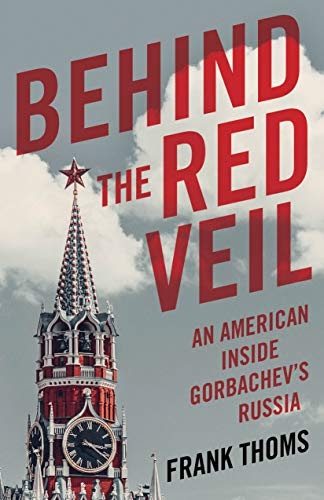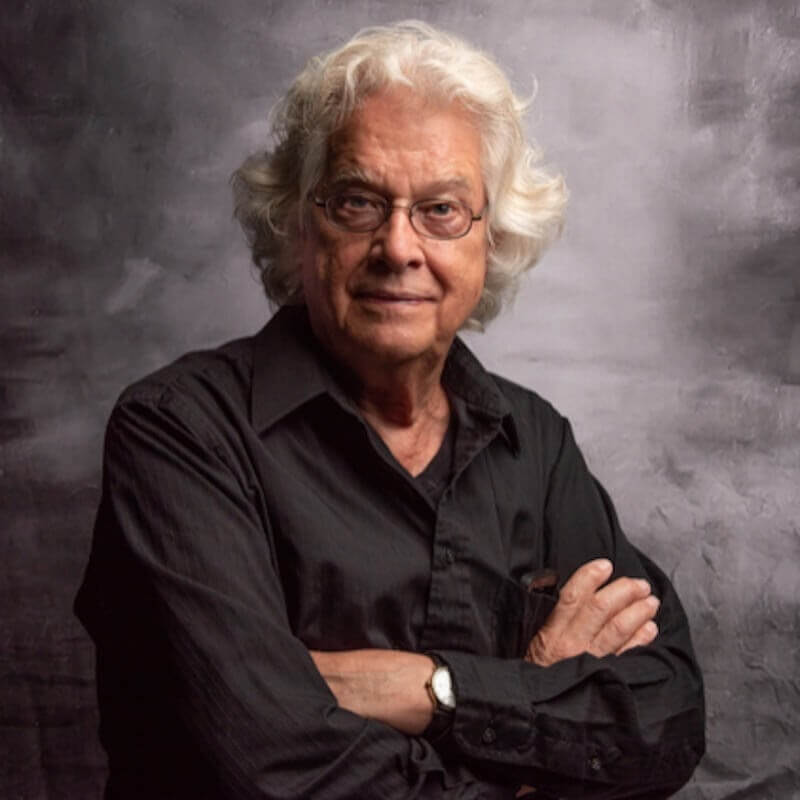FOR IMMEDIATE RELEASE
 San Miguel de Allende, Mexico –– The 1985–1991 policies of perestroika and glasnost marked a new age of openness and transparency in the USSR, leading to an increased mutual curiosity between ordinary Americans and Russians. Beginning with his first trip behind the Iron Curtain, Frank Thoms sought to engage in empathic conversations with everyone he met. Yet he understood he would be inside one of the most inaccessible countries on the planet. In the classroom, he forged close relationships with his students and colleagues. On the streets and in flats, he opened his heart to Russians, and they opened theirs to him.
San Miguel de Allende, Mexico –– The 1985–1991 policies of perestroika and glasnost marked a new age of openness and transparency in the USSR, leading to an increased mutual curiosity between ordinary Americans and Russians. Beginning with his first trip behind the Iron Curtain, Frank Thoms sought to engage in empathic conversations with everyone he met. Yet he understood he would be inside one of the most inaccessible countries on the planet. In the classroom, he forged close relationships with his students and colleagues. On the streets and in flats, he opened his heart to Russians, and they opened theirs to him.
Thoms went to the Soviet Union seeking to find common ground with its citizens — not to judge but to learn, not to bring America to them, but to be an American with them. As a result, he gained the trust and confidence of the people he befriended — and discovered much about himself.
Behind the Red Veil: An American inside Gorbachev’s Russia (SparkPress, Sept. 15, 2020) recounts Thoms’s quest to understand Russian culture through the eyes of its people. He spent his first twenty-five years as a teacher in New England pursuing an understanding of Marxism, Russian history, and Soviet Communism. He ventured to the USSR for the first time in October 1985 — Mikhail Gorbachev’s first year as general secretary of the Communist Party of the Soviet Union. Over the course of six additional trips, Thoms was twice selected as a US–Soviet exchange teacher of English in Leningrad (St. Petersburg). And twice on his own, he taught English in Moscow and Alma-Ata (Almaty), Kazakhstan. In 1994, in the aftermath of Gorbachev’s resignation, he took his final journey to the new Russia.
Praise for the author…
“An insightful perspective of an American educator’s experience within the Soviet education system. Thoms manages to write his story with warmth and wisdom. A delightful read.”
–Pavel Kozhevnikov, Lecturer, Russian Language and Cultures, University of Colorado
“Frank Thoms’s Behind the Red Veil is not only a souvenir from the USSR but also to a great extent an insight into what Russian schools feel deep inside. When Frank appeared at my school, he did not feel, look, or smell like a teacher. His teaching and learning was the Klondike of new experience, both for him and me.”
–Mikhail Baushev, former teacher at School Nº185
“Behind the Red Veil: An American inside Gorbachev’s Russia”
Frank Thoms | September 15, 2020 | SparkPress | Memoir
Paperback | ISBN: 978-1684630554 | $16.95
About The Author
 FRANK THOMS: After forty years as a teacher and twelve as a consultant and keynote speaker, Frank Thoms became a writer, publishing four books: Teaching from the Middle of the Room: Inviting Students to Learn with Stetson Press, (2010), and three books with Rowman & Littlefield, Teaching That Matters: Engaging Minds, Improving Schools (2015); Exciting Classrooms: Practical Information to Ensure Student Success (2015); and Listening is Learning: Conversations between 20th and 21st Century Teachers (2019). He spent the majority of his teaching career with eighth graders in public and private schools in New Hampshire and Massachusetts. He coached soccer and hockey, directed an educational consortium, had his own darkroom, wrote op-eds, led bike tours, rebuilt his VW engine, played volleyball and softball, and served as an educational consultant. For the past nine years, he has lived with his wife in San Miguel de Allende, Mexico, where he continues to write, joined a philosophy group, mentors university students, and is a member of a book group. He is also on the faculty of the San Miguel Writers’ Conference and Literary Festival and serves as its Ambassador-at-Large.
FRANK THOMS: After forty years as a teacher and twelve as a consultant and keynote speaker, Frank Thoms became a writer, publishing four books: Teaching from the Middle of the Room: Inviting Students to Learn with Stetson Press, (2010), and three books with Rowman & Littlefield, Teaching That Matters: Engaging Minds, Improving Schools (2015); Exciting Classrooms: Practical Information to Ensure Student Success (2015); and Listening is Learning: Conversations between 20th and 21st Century Teachers (2019). He spent the majority of his teaching career with eighth graders in public and private schools in New Hampshire and Massachusetts. He coached soccer and hockey, directed an educational consortium, had his own darkroom, wrote op-eds, led bike tours, rebuilt his VW engine, played volleyball and softball, and served as an educational consultant. For the past nine years, he has lived with his wife in San Miguel de Allende, Mexico, where he continues to write, joined a philosophy group, mentors university students, and is a member of a book group. He is also on the faculty of the San Miguel Writers’ Conference and Literary Festival and serves as its Ambassador-at-Large.
In an interview, Frank Thoms can discuss:
- What Gorbachev’s policies meant for Americans who wanted to learn about the “culture of the enemy”
- His experiences as a teacher living and working in the USSR
- Why he sought common ground with his students and colleagues, as opposed to trying to Americanize them
- What major obstacles impeded his efforts to understand Russians and their culture
- What surprised him the most about life in the USSR
- What his friends, colleagues, and students ultimately taught him both about Russia and himself
An Interview with Frank Thoms
You have spent decades as an educator and have written multiple books on pedagogy. Your latest book, a memoir on teaching in Gorbachev’s Russia, has a clear appeal to fellow educators, but it also benefits the general reader. What message do you hope these readers take away from this book?
Russians are people who live with the hopes and dreams of all of us. Throughout the book, readers will feel the yearnings of my Russian friends’ wanting to come out from under the ubiquitous cloak of the Communist system and to be able to have choices in their lives. And they wanted to be listened to.
What did you learn about Russian culture during the time you spent living and working in the USSR?
Russians are kind, combative; generous, unpredictable; hopeful, depressed; loving, fearful; honest, deceptive; open, secretive. By invoking the matryoshka metaphor––Russian nesting dolls––I searched for the inner layers of Russian life behind the red veil. In the public sphere, they would focus on doing the bidding of those in authority. But in their flats––cocoons behind the red veil––people lived away from the Soviet veneer, the drab of daily life. We submerged into the moment, shared common understandings, and cultivated a mutual trust.
What did you learn about yourself during that time?
That my insatiable curiosity took me to places I probably should not have gone. That when being myself it endeared me to my students but could cause anxiety among my colleagues. That I could be me without pretense, which kept me from succumbing to others’ expectations. That when choosing to listen it provided me opportunities for growth and self-understanding. Like when I listened to Kazakh sixteen-year-olds share their thoughts about reincarnation.
When you returned to Russia in 1994 following the dissolution of the USSR, what had changed?
Except for upgraded hotels, new Finnish Intourist busses, Western billboards, and numerous foreign cars, I came back to a familiar country. It had the same shortages in shops, its tired busses, dirty back streets, people in drab colors, bábushkas in headscarves, and frustrated citizens with the profusion of old bureaucracies. As the Soviet Union had imported the old Russia, the new Russia was perpetuating former Soviet times.
How did your experiences in Russia shape your ideas regarding transcultural communications?
Be yourself. Come ready to blend with those with whom you meet. Be with them on their terms. When things don’t work out, stay within, wait, and let matters happen as they happen. As a foreigner, you are not in charge, not for one moment!
Do you have any advice for Americans who are trying to learn from other cultures in this current climate, in 2020?
In this time, people are longing for other lands, to travel to unknowns. Having to stay home, however, gives us time to venture virtually. The best way, in this author’s opinion, is reading good books––to escape, if you will, to other worlds, to other peoples. A book allows us to absorb other cultures, build visions inside our heads, collect emotions in our hearts at our own time and pace––and to set sights for traveling when time allows.

A former award-winning journalist with national exposure, Marissa now oversees the day-to-day operation of the Books Forward author branding and book marketing firm, along with our indie publishing support sister company Books Fluent.
Born and bred in Louisiana, currently living in New Orleans, she has lived and developed a strong base for our company and authors in Chicago and Nashville. Her journalism work has appeared in USA Today, National Geographic and other major publications. She is now interviewed by media on best practices for book marketing.

